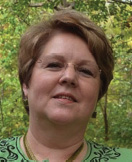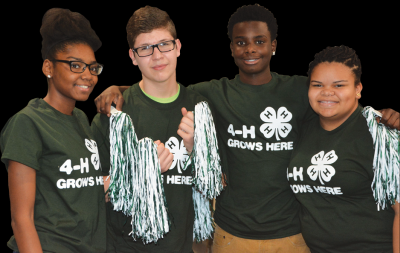MSU Extension: Serving Michigan's Children and Youth for more than 100 Years
- Julie Chapin
- Director, Children and Youth Institute
- Michigan State University Extension
- College of Agriculture and Natural Resources
.jpg)
Youth at 4-H Great Lakes Natural Resources Camp learn about ecological concepts such as coastal ecology, fisheries management, limnology, invasive species management, and forestry.
During his talk for the MSU Global Engagement Speaker Series in February 2017, Dr. Shawn Wilson of Southern Cross University in Australia argued that relationship-building is the primary job for engaged researchers. Few examples of this level of relationship-building are as comprehensive as the work done by Michigan State University Extension (MSUE) offices across the state. With personnel in every county, Extension has close relationships with communities and community leaders everywhere.
Extension's Children and Youth Institute
MSUE's Children and Youth Institute serves children and youth from birth through age 19, focusing on early childhood education and youth development. In 2016, the Children and Youth Institute provided 212,000 kids with Extension-sponsored youth programming (requiring the participation of 17,000 volunteers and numerous community partners). Most of those connections were carried out under the banner of 4-H.
 Julie Chapin is the director of the Institute. "Our staff in the county offices work with 4-H volunteers and other community partners," she explained. "They partner with schools, with boys and girls clubs, with Big Brothers Big Sisters, with United Way and the Department of Health and Human Services in working with kids in foster care, foster care families, kids aging out of foster care, and some of those kinds of situations."
Julie Chapin is the director of the Institute. "Our staff in the county offices work with 4-H volunteers and other community partners," she explained. "They partner with schools, with boys and girls clubs, with Big Brothers Big Sisters, with United Way and the Department of Health and Human Services in working with kids in foster care, foster care families, kids aging out of foster care, and some of those kinds of situations."
The goal is to provide services for all children and youth, without duplicating the efforts of other organizations. So partnerships are unique to each community, based on the organizations already at work.
Extension 4-H also works with adults who have a hand in the lives of children and youth—from parents and caregivers to educators and 4-H volunteers. Some of this engagement takes the form of professional development with organizations and communities.

Participants in Oakland County's Michigan 4-H Tech Wizards, a small-group mentoring program with a focus on science, technology, engineering, art, and math, enjoy a night of fun at 4-H Day at the Breslin Center.
The institute has also received federal grants for early childhood education. "We partner with faculty in human development and family studies around an early childhood research project using the Building Early Emotional Skills curriculum that Holly Brophy-Herb [of MSU's Department of Human Development and Family Studies] has developed," Chapin said. "We've been piloting that in some rural and urban communities in the state. We're in year four of that grant, looking at various delivery models, working with parents and child care providers with the curriculum, both face to face and through online trainings."
Extension's contribution to that project is providing staff who are recruiting audiences and delivering programs in local communities.
"Holly has developed the curriculum," Chapin said. "We have worked with her to revise that curriculum for delivery in community-based settings as opposed to formal education arenas. And we helped prepare the curriculum to be delivered online, because that had not been an approach. We have found that with the online component, participation and completion of the program is higher than the face-to-face component."
A Dispersed but not External Partner
The Children and Youth Institute currently has a staff of 150, primarily located in county offices across the state. The largest component of that staff are 4-H program coordinators. MSUE staff work in 82 of Michigan's 83 counties. They work at the community level with volunteers, and they form partnerships with schools. They take programming into the schools as well as design programs that are intended to extend in-school learning to out-of-school environments.

Youth compete in a 4-H regional robotics competition, in which they design and build a robot that must complete a prescribed task.
"I think one of the things that most faculty on campus don't understand about Extension is that the educators who are based across the state are master's- and Ph.D.-level people. They have the capability to engage in applied research," Chapin said. "They also bring to the table those community connections and relationships. I would like us to think about how we can better partner to inform the work of research faculty that are campus based, and meet the needs of communities through a partnership and a connectedness, because we're all MSU."
Chapin believes that collaborating with faculty helps faculty research. Extension staff understand the concerns of local communities across the state. MSUE recently completed a needs assessment process to identify emerging issues in communities.
"We're still digging through the data," Chapin said. "We know that one of the areas that is important for communities is workforce development, helping prepare kids for employment in the state. There's a particular interest in agricultural employment, because agriculture is a big component of our economy. We also know that basic living-skills education for youth is a big interest and need. And then there's early childhood education, helping prepare young children and their families for school."
Analysis of this data will help Extension direct resources—resources that could give Head Start, for example, greater capacity to help prepare low-income children for school.
"If we can enhance that and connect that with some community-based programs, where we're doing parent education, where we're doing childcare provider education, which is our primary focus in Extension, it just increases the ability of people to help their own children," she said. "Adding that community-based component, which we have the capability to do, and the staff with the expertise to do, just enhances that safety net."
- Written by Matt Forster, University Outreach and Engagement